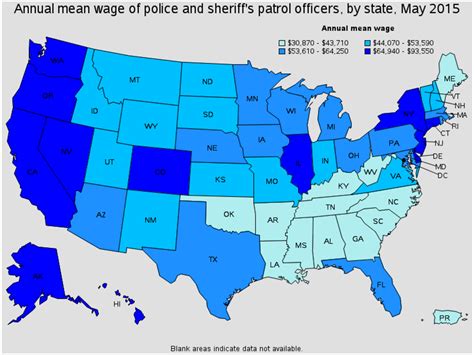For those driven by a commitment to public service, integrity, and honor, a career as a New Jersey State Trooper is a prestigious and rewarding path. Beyond the intrinsic satisfaction of protecting and serving the Garden State, this career offers significant financial stability and a clear path for professional growth. The earning potential is substantial, with troopers starting at over $74,000 post-academy and having the ability to earn well into the six-figure range through experience, promotion, and specialization.
This guide will provide a comprehensive analysis of the New Jersey State Police (NJSP) salary structure, the factors that influence it, and the long-term outlook for this esteemed profession.
What Does a New Jersey State Police Trooper Do?

A New Jersey State Trooper is a sworn law enforcement officer with statewide jurisdiction. Their responsibilities are far more varied than those of a typical municipal officer. While duties include patrolling highways, enforcing traffic laws, and responding to emergencies, troopers are also involved in complex criminal investigations, forensic sciences, counter-terrorism efforts, and homeland security. They may serve in specialized units such as the Marine Services Bureau, the Aviation Bureau, K-9 units, or the elite T.E.A.M.S. (Technical Emergency and Mission Specialists) unit. Their role is critical to the state's public safety infrastructure, operating from barracks and specialized stations across New Jersey.
Average New Jersey State Police Salary

The salary for a New Jersey State Trooper is transparent and primarily dictated by a collective bargaining agreement, ensuring a clear and predictable pay progression. This structure removes much of the guesswork associated with private-sector compensation.
According to official NJSP recruitment information, the salary progression is as follows:
- Academy Salary: While training at the academy, recruits earn a salary.
- Starting Salary (Post-Academy): Upon graduation, a Trooper's starting salary is $74,860.08 (as of the most recent data).
As troopers gain experience, their salary increases through a structured step system. After several years of service, a Trooper I (the senior trooper rank) can expect to earn a base salary of $151,192.83.
Salary aggregator data provides a broader view that often includes overtime and other compensation.
- Salary.com reports that the salary range for a State Police Officer in New Jersey typically falls between $64,482 and $76,145, but this likely reflects a blend of state and other police roles and may not fully capture the higher end of the NJSP pay scale.
- Glassdoor data, which is based on user-submitted information, often shows a higher "total pay" figure, estimating an average around $98,000 per year for a State Trooper in New Jersey, factoring in additional pay like overtime and stipends.
It's crucial to understand that while the base salary is fixed, total annual earnings can be significantly higher due to overtime, holiday pay, and special allowances.
Key Factors That Influence Salary

While the NJSP has a defined pay scale, several factors influence a trooper's overall compensation and career trajectory.
### Years of Experience and Rank
This is the single most significant factor in determining a trooper's base salary. The NJSP operates on a seniority-based step increase system. A newly graduated trooper starts as a Trooper II and, after a set number of years, advances to Trooper I, reaching the top of the trooper pay scale.
Beyond this, promotion to supervisory ranks brings substantial salary increases. The promotional path and its associated earnings potential include:
- Sergeant
- Sergeant First Class
- Lieutenant
- Captain
Each promotion comes with a new, higher pay grade, making career advancement a direct path to increased income.
### Area of Specialization
While most specialized roles do not offer a different base salary, they are a primary driver of higher overall earnings through stipends and overtime opportunities. For example:
- K-9 Unit: Troopers in the K-9 unit often receive a stipend to cover the costs of caring for their canine partner at home.
- Aviation Bureau (Pilots): These highly skilled roles can come with specialized pay due to the extensive training and certifications required.
- T.E.A.M.S. and Investigative Units: Members of tactical or major crime investigation units frequently work longer hours or are on call, leading to significant overtime pay that boosts their annual income far above their base salary.
### Geographic Location
Unlike municipal police departments where pay can vary drastically from one town to another, the New Jersey State Police have a single, statewide pay scale. However, location can still influence net pay through station allowances or other stipends designed to offset the cost of living in more expensive regions of the state, such as North Jersey (Bergen, Hudson counties) versus South Jersey (Salem, Cumberland counties). The core salary remains the same regardless of where a trooper is stationed.
When compared to other law enforcement in the state, the U.S. Bureau of Labor Statistics (BLS) reports that the annual mean wage for all "Police and Sheriff's Patrol Officers" in New Jersey is $95,360. The NJSP salary structure is highly competitive within this landscape, especially at the senior trooper and supervisory levels.
### Level of Education
The minimum requirement to become a New Jersey State Trooper is a high school diploma or GED. However, higher education can be a significant asset. While an associate's or bachelor's degree does not typically result in a higher starting salary, it is often a prerequisite for promotion to higher executive ranks like Lieutenant, Captain, and beyond. Furthermore, some collective bargaining agreements may include small annual stipends for troopers who hold advanced degrees, making education a valuable long-term investment for career advancement.
Job Outlook

The career outlook for law enforcement professionals, including state troopers, remains stable. According to the U.S. Bureau of Labor Statistics (BLS), overall employment for Police and Sheriff's Patrol Officers is projected to grow 3 percent from 2022 to 2032.
For the New Jersey State Police specifically, hiring is dependent on state budgets and the rate of retirements. As senior troopers retire, consistent demand is created for new recruits to fill the ranks. The rigorous selection process ensures that only the most qualified candidates are chosen, making it a competitive but secure career path for those who are accepted.
Conclusion

A career with the New Jersey State Police is a calling that demands dedication and skill, and it rewards that commitment with a strong, transparent, and lucrative compensation package. With a starting salary over $74,000 and a clear progression to over $150,000 for senior troopers, the financial prospects are excellent.
For individuals considering this path, the key takeaways are:
- Clear Salary Growth: Your income is not a mystery; it grows predictably with your years of service.
- Promotion Pays: Advancing through the ranks is the most direct way to increase your base salary significantly.
- Overtime and Specialization Boost Earnings: Your total take-home pay can be much higher than your base salary, especially if you pursue a specialized role.
- A Stable, Respected Career: The NJSP offers a secure and prestigious long-term career in public service with excellent benefits and retirement plans.
If you are seeking a career that combines purpose with financial security, becoming a New Jersey State Trooper is an exceptional opportunity to explore.
